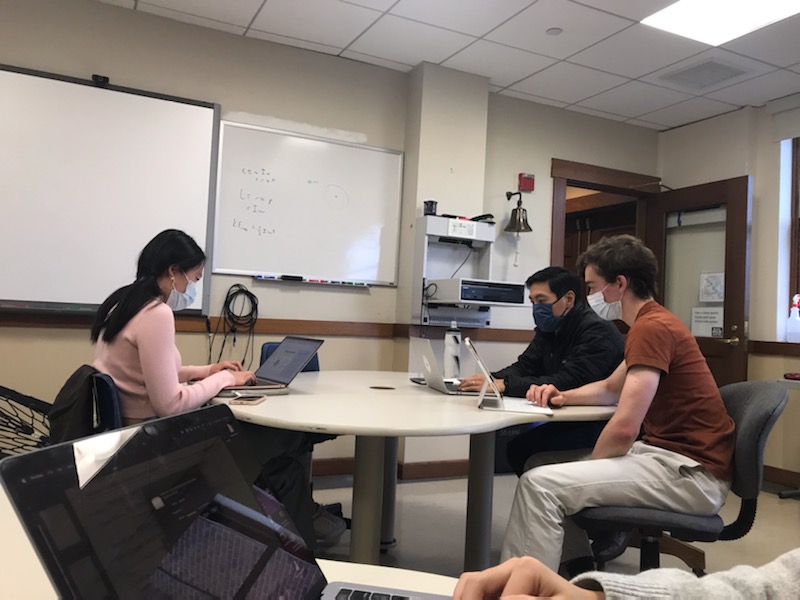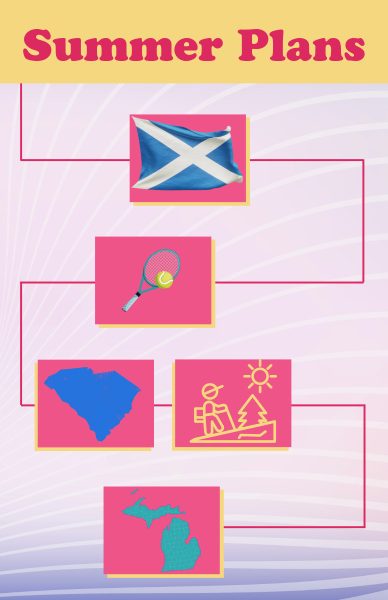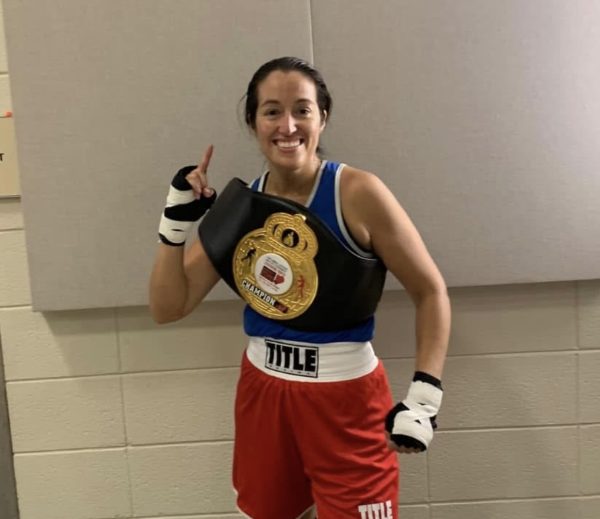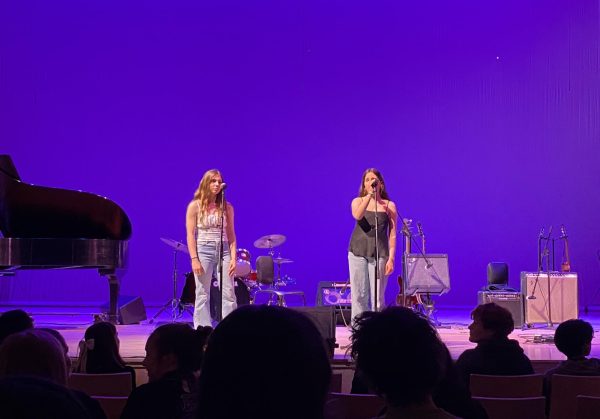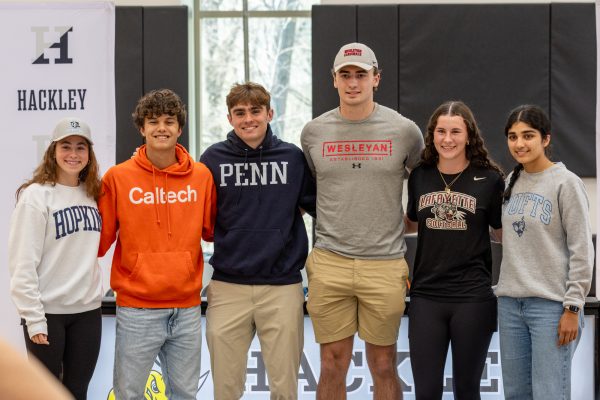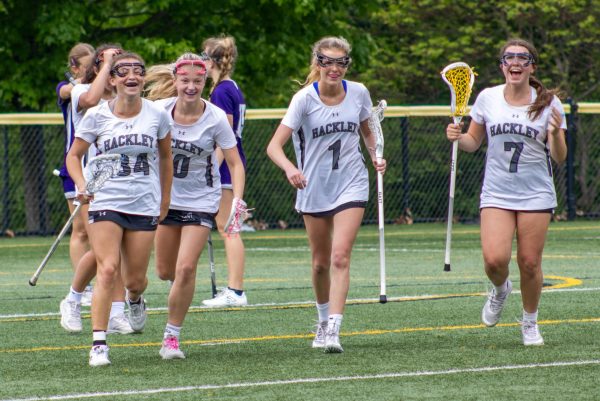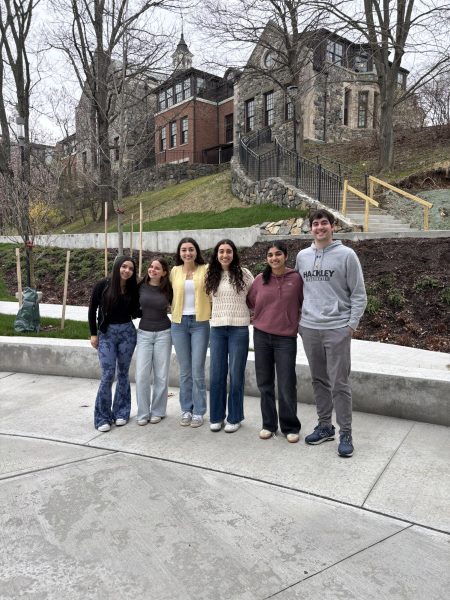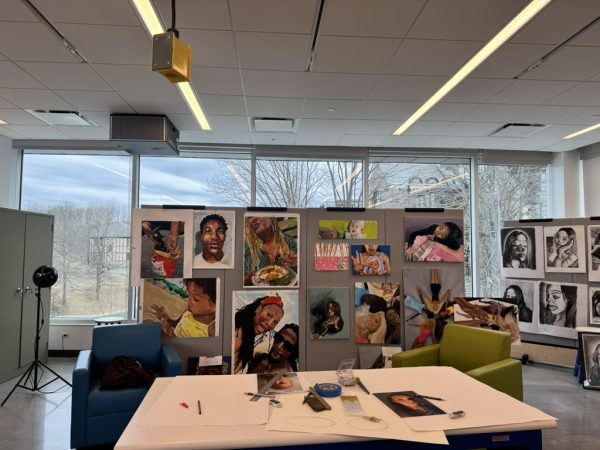Students describe their experiences in the Independent Research Program
Credit: Bella Wasserman
IRP members Katherine Chen and Aiden McComiskey discuss their upcoming presentations with IRP director Dr. Ying. Through IRP, Katherine and Aiden have the opportunity to pursue scientific subjects that pique their interest.
In the spring of ninth grade, freshmen are allowed to apply to Hackley’s Independent Research Program, IRP. Established in 2015, IRP is a three-year program that allows students to grow in their research skills through studying topics relating to science, math, or computer science. The IRP website describes it as an “opportunity to participate in authentic scientific research in a genuine setting.” Students participate in collegiate-level scientific research under the guidance of both the program’s experienced advisor Dr. Ying and a mentor who is an expert in the field of interest.
Each year, two to five freshmen are accepted to the IRP. The application process consists of an essay and an interview, through which students are evaluated on what characteristics they possess that would help them find success in this type of program, potential topics they might be interested in researching, and why they are interested in the topic. Those students accepted into their programs spend the summer preceding their sophomore year, beginning to explore their topic and research.
During the school year, the IRP class counts as a major, meeting six times per seven-day cycle. Students receive a maximum of 30 minutes of homework and while they have no quizzes, tests, or exams, they do have assignment deadlines to meet. As long as these deadlines are met, IRP students receive a passing grade. Over the summers following sophomore and junior year, students are expected to spend six to eight weeks in a lab. This is a large time commitment, and students must be prepared to learn to manage their time accordingly along with other classes.
“It’s pretty reasonable… most of the time class time in IRP is dedicated to just doing what will carry on into homework,” sophomore Harper Kelsey said.
Over the summer leading up to her sophomore year, Harper began her research by reading articles and doing a write-up on each of them. For sophomores, the general goal for IRP students is to decide on a research topic and contact potential mentors. Class time is spent learning about literature reviews, designing and conducting experiments, and data analysis.
Harper is spending her first year in the Independent Research Program researching in vitro gametogenesis, which she explained as an assisted reproductive technology that can turn stem cells into sperm or egg cells, which can then be used in the reproductive process. This is useful to infertile or same-sex couples who desire a biological child. Through IRP, Harper is able to pursue a topic that interests and is important to her, keeping her actively engaged in what she is doing. “For this year of research, I want to try and find a mentor, set that up, and get a better grasp of the processes of IVG specifically.”
Junior year IRP students learn to analyze and present data in the form of written reports and presentations. They also spend time mentoring sophomore IRP students. Their goal for the year is finalizing their research project and securing a mentor. Kiran Marfatia, a junior in his second year of research, spends class periods making edits to a paper he plans to submit to a science competition in the next year.
Kiran explains, “most of the class is you doing your own work, and in addition to that, you have meetings with Dr. Ying, and you’re a part of a team. There are different teams in each section that have similar topics, and every cycle you have a team meeting to discuss progress.”
Kiran is researching aerodynamics in aircraft design. “I’ve liked planes since I was a kid,” he said, “and I thought that going about this could be the start of something I might want to pursue as a career.”
This past summer, Kiran had an internship at NASA (National Aeronautics and Space Administration). “I did computer-based aircraft modeling, where I modeled the flaps of an aircraft – basically I wrote a program in Python, that simulated the flaps on the wing of an aircraft – which would then be integrated into an overall project for the model of a plane which is going to be used for hybrid electric aircraft usage.”
This year, Kiran hopes to prepare a presentation to enter into a science competition. He plans to get a paper, poster, and presentation done. He continues to be in contact with his mentor from NASA and the project lead.
According to the IRP Website, there is no requirement for students to stay all three years. “Definitely do it;” Harper said, “if you have a goal in mind if there’s something that you’re passionate about, go for it – because it also teaches you life skills. How to write a cover letter, how to write a resume, it’s just overall a good class to be in.”

